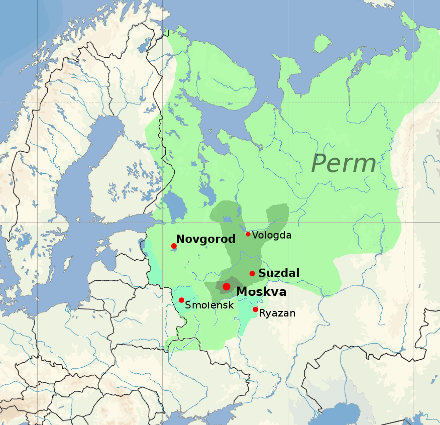As I mentioned, I’ve been going down a rabbit hole with this lecture series by Timothy Snyder about Ukraine, and there was a new one last night that I’ve been listening to, part of which I found fascinating for reasons that have nothing to do with Ukraine. in his recent lecture he talks about the subject of what he calls Deep Geography, and he spends a lot of time on the naming of things. He talks, for example, about the linguistic change from “The Ukraine” to “Ukraine” and how it has to do with certain languages such as Polish which allowed the use of prepositions in referring to Ukraine that were the ones you used with uncertain or ambiguous locations. I think of a little like the difference between saying you are going to “Colorado” versus saying you are going to “the coast”.
Anyway, he also made reference to the fact that he was in Ukraine recently listening to their local news and noticed that the newscasters regularly referred to Russia as “Moscovia”. Now, “Moscovia” is a real thing (a fact which I did not know until recently). What exactly it refers to is, of course, dependent on who you ask, but essentially it refers to a region of what we now consider Russia which coalesced in the 9th century (maybe) and laid claim (maybe) to all of what we consider “Russia” around about the 14th century (again, maybe).
The point is, the use of this word Moscovia is very intentional by the Ukrainians, and it refers to at least two things: rejecting the automatic assumption that the borders of modern Russia should be what they are today, and rejecting the assimilation of the term Rus’ (which has historical connotations that include modern day Ukraine). This word is specifically chosen to reject claims Russia has to Ukraine and, furthermore, insinuate - at least gently - that Russia does not even have claim to, well, Russia.
More succinctly, this word is chosen to piss off Russia. Specifically, that aspect of Russia that believes in imperial Russia, or the “Russian World” idea. Of course, why they do this is self-evident. But what I find interesting is how well it works, both to boost Ukrainian morale and to irritate and enrage Russians. It really works. And what I find interesting about that - way beyond Ukraine - is what it says about who we are, as humans, and how much we enjoy clinging to our ideas and myths. Our personal stories are so important to us that few things will piss us off as much as having someone casually mention that they aren’t true. This is just as true for Imperialist Russians as it is for me, a suburban American. I would not enjoy, for example, having someone refer to America as “The Colonies”. I don’t particularly enjoy having someone point out that America is named for an idiot who got lost. People got pretty pissed when it was pointed out that we had a whole holiday named after an explorer who committed genocide and, uh, also got lost.
Point is, we like our sacred cows, and language is one of those core areas that can hide some of our deep-seated assumptions.
